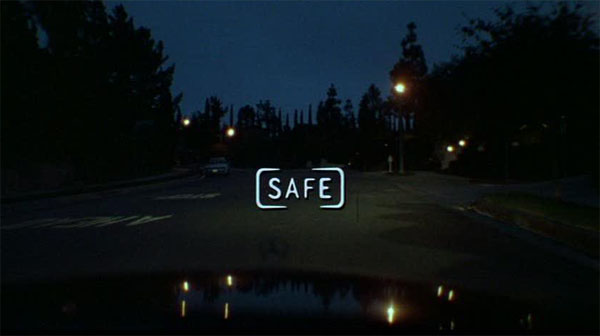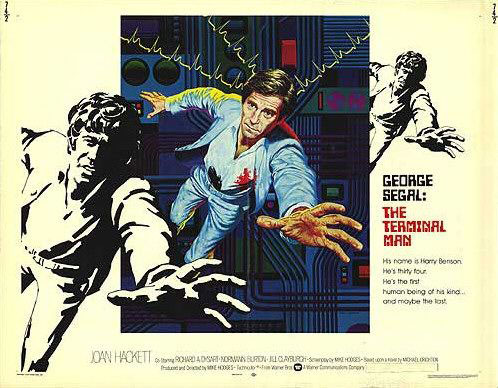Neither you nor I have quite made our way through the new issue of Screening the Past yet, but here’s another deep resource to mine, the latest “Study of a Single Film” from Catherine Grant at Film Studies for Free: “This one is dedicated to gathering direct links to freely accessible, high-quality studies of Todd Haynes‘s remarkable film [SAFE] (1995).” And it opens with a terrific video essay (5’23”).
More reading. For Criterion’s Current, Peter Cowie will soon be launching “a series of short ‘flashbacks.’ They will not focus on analysis of films or filmmakers; instead, I hope they will offer a sequence of entertaining snapshots of personalities past and present, revealing the human beings behind the movies.”
My Lunches With Orson: Conversations Between Henry Jaglom and Orson Welles, edited by Peter Biskind, will be out next month, and New York‘s run three hilarious, disheartening, fascinating, and more than occasionally, quite random excerpts. I don’t even know where to take a sample. If you haven’t read them yet, just go. Also in New York, Jennifer Vineyard talks with Paul Feig about his cultural influences.
Cinephilia and Beyond draws our attention to a piece producer Mike Kaplan wrote back in March—for the Huffington Post, which is why it’d gone unnoticed around here until now. In short, it’s a plea for a reconsideration of Mike Hodges’s oeuvre, but specifically, The Terminal Man (1974), in the form of a story that includes rousing endorsements from Stanley Kubrick and Terrence Malick and recollections of working with Robert Altman. The second part of the tale is told here.
“The great paradox of the politique des auteurs is that it was a repudiation of respectable culture—but their disreputable passions were widely received as respectable.” The New Yorker‘s Richard Brody outlines a brief history before turning to Vulgar Auteurism: “The advocates of V.A. do a great service in recognizing that [John] Hyams and P.W.S. Anderson bring a wider range of inventiveness to their material than do, say, Michael Haneke and Olivier Assayas, and in implying that they would likely have made a far better movie out of Skyfall than Sam Mendes did. But, in terms of the absolute values of cinema and of art, that’s a pretty low standard. And the high-flown romantic rapture in the name of art, which is the grand mythic core of the very idea of the cinematic auteur, or, for that matter, the author in literature, is the dream of the complete and total achievement. It’s too grand and historic a passion to be considered vulgar, even ironically.”
Introducing an examination of the work of David Koepp that incorporates insight gleaned from a conversation with the screenwriter and director, David Bordwell writes that “any artistic tradition houses copycats. A viable tradition provides a varied number of points of departure for ambitious future work. Nothing comes from nothing; influences, borrowings, even refusals–all depend on awareness of what went before. The tradition sparks to life when filmmakers push us to see new possibilities in it.”
In his breezy essay on not seeing movies for the Notebook, Doug Dibbern explains “why making a movie—or writing a book or an essay—is so much less fulfilling, artistically, than watching a movie.”
There’s a new issue of Interiors out, examining Kubrick’s deliberate spatial disorientation in The Shining (1980).
“Poetry, the sister art to music, to painting, yes, but film?” asks Rebecca Morgan Frank in the Los Angeles Review of Books. “If these are sisters, it seems they are the sort that could go years without speaking, and no one would mind.”
“William Riley Burnett isn’t quite as well known as other crime writers like Hammett and Chandler, but the titles of several W.R. Burnett novels and films everybody knows. His career and his influence stretched from gangster novels and movies, which he went a long way to defining, through noir to blaxploitation and beyond.” Among the titles John Strausbaugh covers at the Chiseler: Little Caesar, High Sierra, and The Asphalt Jungle. Burnett also worked on the screenplays for Scarface, This Gun for Hire, and The Great Escape.
“[I]s anything more tired or clichéd than a film reel or a film strip on a film festival poster?” Adrian Curry sketches a history of the aesthetics of film festival posters for the UK’s Independent Cinema Office.
Critics, scholars, and filmmakers are debating “Making Love in the Movies” in the New York Times.
With Johnny Depp heading to theaters as Tonto, UCLA Film & Television Archive director Jan-Christopher Horak traces a history of redface in Hollywood.
In the New York Times Magazine, Nana Asfour reports on Ziad Doueiri’s efforts to have the ban on his film The Attack lifted in his home country, Lebanon.
Sean Macaulay interviews William Friedkin for the Telegraph.
In other news. As Birgit Heidsiek reports at Cineuropa, Fatih Akin has written an open letter to Turkish President Abdullah Gül, calling on him to “Stop this madness!” And for the Wall Street Journal, Joe Parkinson reports that Akin’s also posted a video, arguing that the “Turkish media should be ashamed. For the past 48 hours, the people have been waging a struggle and you have not reported anything about it. Shame on you.”
“Indiewire Influencers is dedicated to 40 of the people and companies who have captured our attention as we watch them try to figure out what the independent film industry is today and, more importantly, what it will become.”
“Giuseppe Tornatore’s art world thriller The Best Offer, starring Geoffrey Rush, was the big winner at Italy’s David Awards, scooping six of the top Italo film nods, including best picture, director, and music, composed by Ennio Morricone.” Nick Vivarelli reports for Variety.
“British artist David Hockney and filmmaker Martin Scorsese will be this year’s honorees at the annual L.A. County Museum of Art’s Art + Film Gala,” reports Deborah Vankin for the Los Angeles Times. “The big-ticket event, which will be held Saturday, Nov. 2, is a fundraiser for the museum and gathers notable names from the art, music, fashion and film worlds.”
The LA-based company Fuel Entertainment is going to go digging in a landfill near Alamogordo, New Mexico in search of the E.T. video game cartridges Atari dumped there in September 1983. Fernanda Santos reports for the NYT.
In the works. Douglas Trumbull, “who worked on the groundbreaking effects for films such as 2001: A Space Odyssey and Blade Runner, as well as directing cult classics such as 1971’s environmentally themed Silent Running, has two full-length projects in the works,” reports the Guardian‘s Ben Child. There’ll be “a science fiction epic that takes place about 200 years in the future, which he hopes to shoot next, and an expanded version of his current short Ufotog, which tells the story of a man’s attempt to photograph an alien spacecraft.”
Obits. “I give this advice to all my producer friends: grab [Augusto] Tretti, have him sign a contract right now and let him shoot whatever crosses his mind. Most of all, don’t ever attempt to have him reacquire his reason; Tretti is the madman that Italian cinema needs.” That’s Federico Fellini, as quoted by Fausto Vernazzani at Twitch. Augusto Tretti’s “life in movies ended prematurely in 1985,” writes Vernazzani, “when he directed Mediatori e Carrozze thanks to his friend Ermanno Olmi, a short movie released on TV five years after his third and final feature, Alcool. Apparently no one cared for his body of work, an impressive trio produced over 20 years, acclaimed by a lot of filmmakers and a few critics.” Tretti died on June 7, a few days short of his 89th birthday.
Jon Jost has posted news of the passing of Dennis Grunes, who posted countless smart reviews at his blog for over six years, and whose book, A Short Chronology of World Cinema, was released in late 2010.
More browsing? Mike Everleth has this week’s “Underground Film Links” while the Film Doctor‘s rounded up a batch of “metadata links.”
For news and tips throughout the day every day, follow @KeyframeDaily on Twitter and/or the RSS feed. Get Keyframe Daily in your inbox by signing in at fandor.com/daily.





